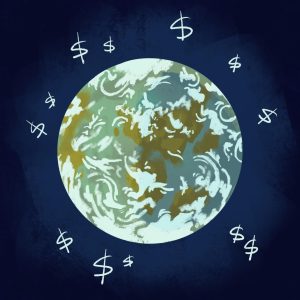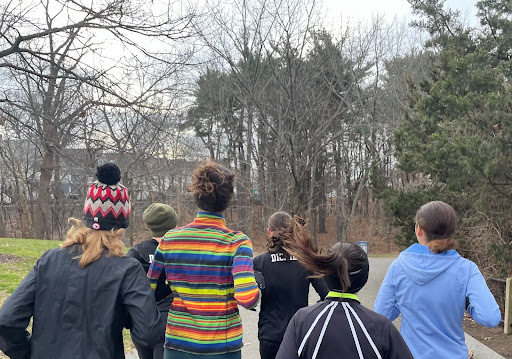Coronavirus Pandemic Is Not “Healing” Our Planet
January 28, 2021
After everything this pandemic has dragged us through in the past year, you may have been wondering: are there any positives to the COVID-19 virus? With factories being closed down, limited driving and airplane flights, and less heating bills for big office and school buildings, the thought may have run across your mind that this pandemic has lowered greenhouse gases, and is now beginning to heal the massive climate crisis. In this belief, you would be both right and wrong.
According to a report from the Rhodium Group, a research and consulting firm, America’s greenhouse gas emissions have fallen over 10% since the beginning of the pandemic, reaching their lowest levels in at least 30 years. Transportation, the largest source of greenhouse gasses, dropped 14.7% in emissions in 2020. Additionally, Americans drove 15% less than in 2019, with jet fuel sales falling by more than a third. Electricity driven emissions plunged by 10.3% in 2020. As demand for electricity descended, utility companies stopped using their coal factories and began to depend on natural gas, a cheaper and more eco-friendly alternative. To claim a federal tax credit, many energy companies built record numbers of solar panels and wind turbines, causing renewable energy to surge in 2020. The US created as much electricity last year from renewable sources as it did from coal, a first in the century-long history of America’s energy economy. According to the Rhodium Group, the drop in emissions is the largest one-year decline since World War 2.
These incredible changes could put the United States within striking distance of the Paris Agreement, a global pact designed to stop climate change signed by nearly 200 nations. Before former President Donald Trump withdrew the nation from the Paris Agreement, President Obama had pledged to bring emission levels down 17% below 2005 levels. Currently, they are 21.5% below 2005 levels.
Unfortunately, many scientists and statisticians around the world warn that this change could mean nothing for the future. Li Shuo, a senior policy adviser for Greenpeace Asia, told the New York Times that when production has slowed down in the past, China’s factories have tended to accelerate their output to make up the lost output: a practice he calls “retaliatory pollution.” The virus could even make China’s carbon emissions shoot up. The Chinese government has set challenging targets for their economy. “Controlling the outbreak and maintaining economic growth are now going to be China’s top priority,” Shuo said, “And we’ve seen in the past, whenever economic growth needs to be prioritized, the environmental agenda takes a back seat.”
Scientists warn that the planet cannot fix climate change until the world has essentially zeroed out in emissions. In other words, one event cannot fix this global climate crisis. The only thing that can heal our planet is lasting change.
The Rhodium Group reported that after the financial crisis of 2008-2009 caused emissions to go down, the economy recovered and emissions immediately rebounded, sending just as much, if not more, greenhouse gasses into the atmosphere than before. “The most significant reductions last year were around transportation, which remains heavily dependent on fossil fuels,” said Kate Larsen, a director at Rhodium Group, “But as vaccines become more prevalent, and depending on how quickly people feel comfortable enough to drive and fly again, we’d expect emissions to rebound unless there are major policy changes put in place.” Scientists warn that the planet cannot fix climate change until the world has essentially zeroed out in emissions. In other words, one event cannot fix this global climate crisis. The only thing that can heal our planet is lasting change.
However, those who are fighting for lasting change must fight on a whole new front. “As an activist I can no longer go outside to do the climate strikes,” said Vanessa Nakate, a Ugandan climate activist who campaigned alongside Greta Thunberg, “Before we could go to schools and talk to students, but now that’s impossible, because the schools are closed.” Many activists are using the hashtag #climatestrikeonline in their social media to protest without spreading the virus. Emma Greenwood, a climate activist from Manchester, England told the BBC, “We’re doing digital strikes online, which is where you post a picture of yourself with a climate placard of how to raise awareness.”
Fortunately, President-elect Joseph R. Biden has named climate change an “immediate priority,” pledging to cut America’s emissions to net zero by 2050. The International Energy Agency said it would publish a detailed blueprint for how it plans to accomplish such an immense task. “Nothing short of a total transformation of our energy infrastructure will be required,” said Fatih Birol, the agency’s executive director, “That calls for decisive action this year, next year and indeed every year to 2050.”









